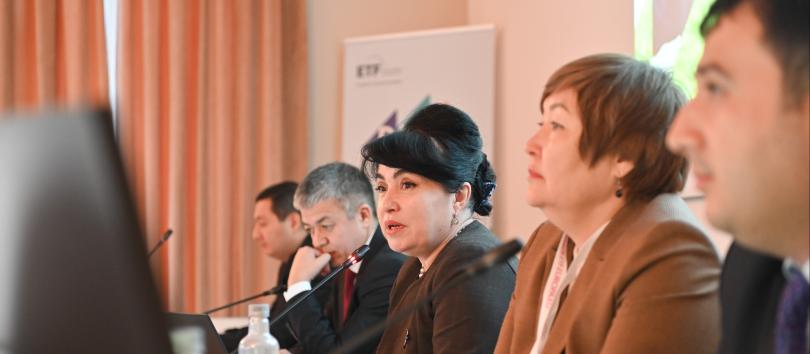
DARYA: Central Asian delegates bring a touch of magic to EU project for greater regional cooperation on youth opportunities
There was a touch of magic about the final sessions of a two-day Turin-based European Training Foundation conference on developing youth skills in Central Asia.
Delegates at the “High-Level Group Meeting” of the EU’s DARYA programme (Dialogue and Action for Resourceful Youth in Central Asia), met Thursday, 23 November, to report back on progress during the first year of the EU’s five-year, €10 million project. The participants – which included deputy ministers of education, and labour, from the five regional countries (Kazakhstan, Kyrgyzstan, Tajikistan, Turkmenistan, and Uzbekistan) convened at Turin’s old vocational education and training centre, Collegio degli Artigianelli (which specialises in crafts) to discuss issues including improved regional data collection, common standards for regionally-recognised qualifications and teacher training.
The school is situated above the headquarters of the Turin branch of Italy’s magic circle – and delegates were invited for a special display of a particular craft loved by all, young and old: magic tricks.
Spellbound by Marco Aimone’s incredible card, rope and cup tricks, the delegates returned to more mundane discussions in a college conference room. But when asked to sum up the value of their close regional cooperation since the launch earlier this year of DARYA – which is being implemented by the ETF - it was clear that magic dust was still in the air.
“It’s magic that we are here all together,” one senior education official remarked.
Another, thinking more in terms of the hard work they have ahead of them to support the development of opportunities for young people across an economically and socially diverse region, noted that to work as a top magician required “great skill – clearly he reached this level by working hard every day.”
Another said: “If we put a lot of effort in, we can achieve our goals.”
It was a lesson in how thinking outside the box can help bring people together for a common purpose – a key tenet of the DARYA project, the EU’s first Central Asian project devoted to improving youth skills.
There has been much progress in the first year, as senior officials and other stakeholders from across the region have begun working to create a level playing field for qualifications and educational standards that meet the exacting needs of the labour market.
Rasul Abazbek uulu, Vice Minister of Education, Kyrgyzstan, said that progress was being made on bringing greater flexibility to professional education, which is why the country needed new skills, “including soft and digital, qualification systems and professional standards.”
Tajikistan’s Deputy Minister of Education and Science, Lutfiya Abdulkholiqzoda, said that working with colleagues across the region had been inspiring. The aims of DARYA – which include an emphasis on green and digital skills – coincide closely with established national policies, including a new law on the Concept of Digital Development of Education.
In Turkmenistan work is underway on new standards in more than 200 professional training programmes to ensure that education meets labour market needs, Azat Atayev, Deputy Minister for Higher and Secondary Vocational Education, said.
Kalamkas Algazinova, Kazakhstan’s Deputy Minister of Professional Education, said that all countries of the Central Asian region were “united by working toward the goal of having highly qualified specialists; the goal is one, but we have many objectives.”
In Uzbekistan, Aziz Melioboev, Head of the Department of Professional Education Integration at the Ministry of Higher Education, Science and Innovations, said that a platform that had been launched to track the careers of professional education graduates was helping to better understand how well training met labour market skills demands.
Looking ahead, there were presentations on how a new tool that employs AI to analyse online job vacancies in real time can help Central Asian countries better understand labour market needs, and the power of using “smart specialisation” approaches to improving skills training for specific economic sectors.
Samuel Cavanagh, the ETF’s DARYA project manager, summarised what delegates could expect to be working on in the coming year. These will include:
- Evidence for Skills, a regional study on new forms of work, with a focus on platform work. The study was being finalised, he said, and its findings would soon be shared.
- Support for the development and piloting of graduate tracking and employee surveys.
- A feasibility study on regional cooperation on the development of new qualifications.
- A peer-learning visit to the EU on governance in training institutions and qualifications.
- Work to develop a pilot study for multi-country qualifications.
- Piloting of an innovative tool SCAFFOLD card deck supporting educators in the teaching of key competences.
More about the DARYA project here.
Did you like this article? If you would like to be notified when new content like this is published, subscribe to receive our email alerts.